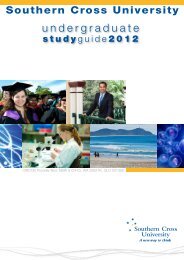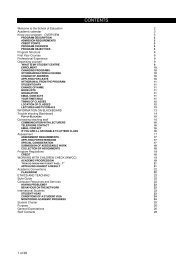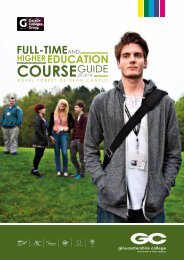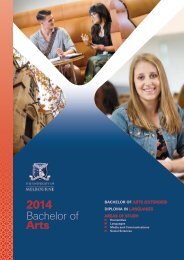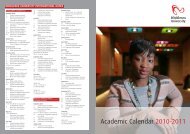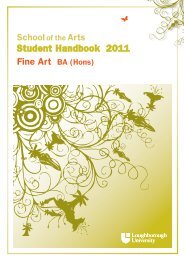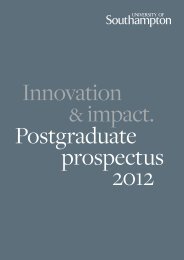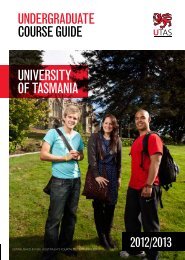City College Birmingham - Study in the UK
City College Birmingham - Study in the UK
City College Birmingham - Study in the UK
Create successful ePaper yourself
Turn your PDF publications into a flip-book with our unique Google optimized e-Paper software.
<strong>City</strong> <strong>College</strong> <strong>Birm<strong>in</strong>gham</strong>Re<strong>in</strong>spection monitor<strong>in</strong>g visit reportUnique reference number: 130465Name of lead <strong>in</strong>spector:Paul Joyce HMILast day of <strong>in</strong>spection: 26 May 2011Type of provider:Address:General fur<strong>the</strong>r education collegeFordrough Campus300 Bordesley Green<strong>Birm<strong>in</strong>gham</strong>B9 5NATelephone number: 0121 204 0000Published date 01 July 2011Inspection Number 366994
Re<strong>in</strong>spection monitor<strong>in</strong>g visit <strong>City</strong> <strong>College</strong> <strong>Birm<strong>in</strong>gham</strong>, 26 May 2011 1 of 4REINSPECTION MONITORING VISIT: MAIN FINDINGSContext and focus of visit<strong>City</strong> <strong>College</strong> <strong>Birm<strong>in</strong>gham</strong> was established <strong>in</strong> 1998. The college operates from anumber of sites around <strong>the</strong> city. Its ma<strong>in</strong> site is at <strong>the</strong> Fordrough campus. Thecollege recruits a high proportion of its students from areas of significant deprivation.Competition to attract school leavers to post-16 education <strong>in</strong> <strong>Birm<strong>in</strong>gham</strong> is <strong>in</strong>tense.Courses are available <strong>in</strong> most subject areas, although provision is small <strong>in</strong> severalareas.The college was last <strong>in</strong>spected <strong>in</strong> November 2010 and <strong>in</strong>spectors judged provisionoverall to be satisfactory. Outcomes for learners, <strong>the</strong> quality of provision andleadership and management were all satisfactory and <strong>the</strong> college had a satisfactorycapacity to improve. Of <strong>the</strong> five sector subject areas <strong>in</strong>spected, English for speakersof o<strong>the</strong>r languages (ESOL) was good, motor vehicle, <strong>in</strong>formation and communicationtechnology (ICT) and hairdress<strong>in</strong>g and beauty <strong>the</strong>rapy were satisfactory and literacyand numeracy was <strong>in</strong>adequate. The <strong>the</strong>mes explored dur<strong>in</strong>g this visit arise from <strong>the</strong>areas for improvement identified at <strong>the</strong> last <strong>in</strong>spection.ThemesSelf-assessment and improvement plann<strong>in</strong>gWhat progress has <strong>the</strong> college made <strong>in</strong> streng<strong>the</strong>n<strong>in</strong>g <strong>the</strong>effectiveness of quality assurance and quality improvementarrangements, <strong>in</strong>clud<strong>in</strong>g <strong>the</strong> use of data and targets toimprove <strong>the</strong> accountability of middle managers?SignificantprogressQuality assurance and quality improvement arrangements have streng<strong>the</strong>nedsubstantially. The college has clearly def<strong>in</strong>ed targets for key areas of performance.Senior managers monitor <strong>the</strong>se much more closely. The availability and accessibilityof data has much improved. The use of timely and accurate <strong>in</strong>formation is now moreeffective to hold managers to account for <strong>the</strong> performance of <strong>the</strong>ir areas ofresponsibility. Senior managers check subject area performance more frequentlythan at <strong>the</strong> last <strong>in</strong>spection. Reviews are more thorough with performance monitoredaga<strong>in</strong>st clearly def<strong>in</strong>ed key <strong>in</strong>dicators that focus on <strong>the</strong> quality of teach<strong>in</strong>g andlearn<strong>in</strong>g and students’ success.Managers and staff are set targets to achieve as part of <strong>the</strong> college’s staffperformance and development review process. These targets are becom<strong>in</strong>g clearerand most now l<strong>in</strong>k closely to <strong>the</strong> college’s key performance targets. Senior managersmonitor <strong>the</strong> completion of appraisals closely and <strong>the</strong> appraisal process now considersa wider range of performance than previously. The college has taken appropriateaction to deal with underperformance and senior managers use competence, supportand discipl<strong>in</strong>ary procedures appropriately to ensure managers and staff are held toaccount for <strong>the</strong>ir performance.
Re<strong>in</strong>spection monitor<strong>in</strong>g visit <strong>City</strong> <strong>College</strong> <strong>Birm<strong>in</strong>gham</strong>, 26 May 2011 2 of 4Outcomes for learnersWhat progress has <strong>the</strong> college made <strong>in</strong> improv<strong>in</strong>g <strong>the</strong>monitor<strong>in</strong>g of students’ attendance and progress s<strong>in</strong>ce <strong>the</strong>last <strong>in</strong>spection?ReasonableprogressManagers and staff now monitor and review attendance and retention more closely.Attendance rates cont<strong>in</strong>ue to <strong>in</strong>crease overall although significant variation <strong>in</strong>attendance rates on different courses rema<strong>in</strong>s. The college has <strong>in</strong>troduced a numberof measures <strong>in</strong> an attempt to fur<strong>the</strong>r improve attendance. The college <strong>in</strong>-yearattendance rate at <strong>the</strong> time of <strong>the</strong> visit was 84%, slightly under <strong>the</strong> college overalltarget of 85%, but an <strong>in</strong>crease of two percentage po<strong>in</strong>ts on <strong>the</strong> previous year. Theoverall <strong>in</strong>-year retention rate at <strong>the</strong> time of <strong>the</strong> visit was 91% and this is similar to<strong>the</strong> retention rate at <strong>the</strong> same po<strong>in</strong>t <strong>in</strong> <strong>the</strong> previous year.The track<strong>in</strong>g and monitor<strong>in</strong>g of students’ progress has improved s<strong>in</strong>ce <strong>the</strong> last<strong>in</strong>spection. Managers and staff now monitor and report more frequently on <strong>the</strong>irprogress. Track<strong>in</strong>g sheets for each course show <strong>the</strong> extent of each student’sprogress. Staff are required to predict whe<strong>the</strong>r each student will successfully achieve<strong>the</strong>ir qualification and record this <strong>in</strong>formation on <strong>the</strong> college’s progress and studentsuccess database. Information from <strong>the</strong> database <strong>in</strong>dicates that achievement ratesare likely to <strong>in</strong>crease this year when compared with last year.Quality of provisionWhat progress has <strong>the</strong> college made <strong>in</strong> develop<strong>in</strong>g <strong>the</strong><strong>in</strong>ternal lesson observation process to ensure more realisticgrad<strong>in</strong>g of lessons and to improve <strong>the</strong> quality of teach<strong>in</strong>g andlearn<strong>in</strong>g?ReasonableprogressThe <strong>in</strong>ternal lesson observation process cont<strong>in</strong>ues to develop. S<strong>in</strong>ce <strong>the</strong> last<strong>in</strong>spection, <strong>in</strong>ternal observers have focused more on <strong>the</strong> extent of students’ learn<strong>in</strong>gand progress to <strong>in</strong>form <strong>the</strong>ir grad<strong>in</strong>g of a lesson ra<strong>the</strong>r than on <strong>the</strong> performance of<strong>the</strong> teacher. Observation records are now more judgemental and <strong>the</strong> text betterreflects <strong>the</strong> grade awarded than at <strong>the</strong> last <strong>in</strong>spection. However, variability rema<strong>in</strong>swith a m<strong>in</strong>ority of records not as clear and conv<strong>in</strong>c<strong>in</strong>g as o<strong>the</strong>rs and <strong>in</strong> a few<strong>in</strong>stances highlight<strong>in</strong>g good practice without sufficient support<strong>in</strong>g evidence.The observation team now meets more frequently and moderates a higherproportion of lesson observation grades than at <strong>the</strong> last <strong>in</strong>spection. More jo<strong>in</strong>t lessonobservations take place dur<strong>in</strong>g this academic year than previously. Managers use<strong>in</strong>formation from lesson observations to target professional development for staff.Attendance for staff development events for teach<strong>in</strong>g and learn<strong>in</strong>g is high. It is tooearly to judge <strong>the</strong> impact of <strong>the</strong>se activities on <strong>the</strong> quality of teach<strong>in</strong>g and learn<strong>in</strong>g asattendees have yet to be re-observed. The profile of grades awarded by <strong>the</strong> lesson
Re<strong>in</strong>spection monitor<strong>in</strong>g visit <strong>City</strong> <strong>College</strong> <strong>Birm<strong>in</strong>gham</strong>, 26 May 2011 3 of 4observation team now provides a more realistic picture of <strong>the</strong> quality of teach<strong>in</strong>g andlearn<strong>in</strong>g <strong>in</strong> <strong>the</strong> college.What progress has <strong>the</strong> college made <strong>in</strong> improv<strong>in</strong>g l<strong>in</strong>ks wi<strong>the</strong>mployers to develop employer responsive provision and toimprove students’ opportunities for work experience andemployment?ReasonableprogressAt <strong>the</strong> last <strong>in</strong>spection, l<strong>in</strong>ks with employers were underdeveloped and too manystudents did not have access to appropriate work experience opportunities todevelop both <strong>the</strong>ir employability skills and <strong>the</strong>ir employment prospects.S<strong>in</strong>ce <strong>the</strong> <strong>in</strong>spection, <strong>the</strong> college has given l<strong>in</strong>ks with employers a high priority and<strong>the</strong>se are develop<strong>in</strong>g well. In <strong>the</strong> short time s<strong>in</strong>ce be<strong>in</strong>g established, <strong>the</strong> employmentservices unit has engaged with many local, and some national, employers. A highproportion of <strong>the</strong>se l<strong>in</strong>ks have resulted <strong>in</strong> opportunities for apprenticeships and <strong>the</strong>college is actively recruit<strong>in</strong>g for <strong>the</strong>se. Employers that responded to <strong>the</strong> monitor<strong>in</strong>gvisit survey, although few <strong>in</strong> number, were very positive about <strong>the</strong> service providedby <strong>the</strong> college. Employer responsive provision is expand<strong>in</strong>g at a controlled rate and<strong>the</strong> college has established systems and procedures to manage this appropriately.Opportunities for work experience <strong>in</strong> subject areas are develop<strong>in</strong>g steadily, as areo<strong>the</strong>r employer l<strong>in</strong>ks such as external visits and visit<strong>in</strong>g speakers. Programmes andsupport to prepare students for employment, <strong>in</strong>clud<strong>in</strong>g a pre-apprenticeshipprogramme, are develop<strong>in</strong>g well. The college recognise <strong>the</strong> need to fur<strong>the</strong>r developand streng<strong>the</strong>n this important area of work.What progress has <strong>the</strong> college made <strong>in</strong> improv<strong>in</strong>g provision<strong>in</strong> literacy and numeracy, which was <strong>in</strong>adequate at <strong>the</strong> last<strong>in</strong>spection?ReasonableprogressAt <strong>the</strong> last <strong>in</strong>spection, provision for literacy and numeracy was <strong>in</strong>adequate. Successrates were low, students made <strong>in</strong>sufficient progress, teach<strong>in</strong>g did not meet <strong>in</strong>dividualneeds, target sett<strong>in</strong>g was poor and managers had not been successful <strong>in</strong> secur<strong>in</strong>gimprovements.S<strong>in</strong>ce <strong>the</strong>n <strong>the</strong> college has carried out substantial staff development with a particularfocus on target sett<strong>in</strong>g and meet<strong>in</strong>g <strong>the</strong> differ<strong>in</strong>g needs of students. Mentors workclosely with each teacher to observe <strong>the</strong>ir performance, establish developmenttargets and to help <strong>the</strong>m to improve <strong>the</strong>ir teach<strong>in</strong>g. Teachers value <strong>the</strong> support anddevelopment <strong>the</strong>y have received. They are beg<strong>in</strong>n<strong>in</strong>g to make use of <strong>the</strong>ir improvedknowledge and skills <strong>in</strong> <strong>the</strong> classroom, some with more confidence than o<strong>the</strong>rs do.Students acknowledge <strong>the</strong> improvements <strong>in</strong> teach<strong>in</strong>g, say<strong>in</strong>g that teachers are betterprepared and that <strong>the</strong>y enjoy <strong>the</strong>ir lessons. Staff share schemes of work. Lessonplans and assessment activities have been standardised. Teachers now set more<strong>in</strong>dividual, timely and useful targets for students and monitor progress moreeffectively. Students are aware of <strong>the</strong>ir <strong>in</strong>dividual targets and <strong>the</strong> progress <strong>the</strong>y are
Re<strong>in</strong>spection monitor<strong>in</strong>g visit <strong>City</strong> <strong>College</strong> <strong>Birm<strong>in</strong>gham</strong>, 26 May 2011 4 of 4mak<strong>in</strong>g. In-year retention, attendance and punctuality have improved. It is too earlyto judge <strong>the</strong> full impact of <strong>the</strong>se changes, as students’ success rates are not yetknown.Leadership and managementWhat progress <strong>the</strong> college made <strong>in</strong> improv<strong>in</strong>g <strong>the</strong> clarity andtimel<strong>in</strong>ess of reports to <strong>the</strong> govern<strong>in</strong>g body to enablegovernors to scrut<strong>in</strong>ise more effectively and challenge <strong>the</strong>academic and f<strong>in</strong>ancial performance of <strong>the</strong> college?ReasonableprogressGovernors now receive more detailed reports and <strong>the</strong>y are better <strong>in</strong>formed about <strong>the</strong>college’s academic performance and f<strong>in</strong>ancial position than <strong>the</strong>y were at <strong>the</strong> last<strong>in</strong>spection. Managers have completed a well-considered f<strong>in</strong>ancial appraisal andgovernors understand well its implications for <strong>the</strong> college. Carefully consideredstrategic and f<strong>in</strong>ancial plann<strong>in</strong>g, toge<strong>the</strong>r with much improved f<strong>in</strong>ancial managementand control of <strong>in</strong>ternal budgets, cont<strong>in</strong>ues to reduce operat<strong>in</strong>g costs although <strong>the</strong>f<strong>in</strong>ancial position rema<strong>in</strong>s weak.Governors have reconstituted a Quality Committee to have a clearer focus on qualityof teach<strong>in</strong>g and learn<strong>in</strong>g and outcomes for learners. They receive reports on <strong>the</strong>quality of teach<strong>in</strong>g and learn<strong>in</strong>g, students’ attendance and retention, which enables<strong>the</strong>m to monitor more closely <strong>the</strong> key performance <strong>in</strong>dicators for <strong>the</strong>se areas.Governors have a develop<strong>in</strong>g understand<strong>in</strong>g of <strong>the</strong> issues <strong>in</strong>fluenc<strong>in</strong>g <strong>the</strong> academicperformance of <strong>the</strong> college. They are now start<strong>in</strong>g to challenge and support seniormanagers more effectively. The pr<strong>in</strong>cipal has identified that governors, toge<strong>the</strong>r withsenior managers, need to be more engaged <strong>in</strong> <strong>the</strong> leadership of learn<strong>in</strong>g and hasrecently proposed <strong>the</strong> <strong>in</strong>troduction of arrangements to enable governors to l<strong>in</strong>k withcurriculum areas to improve fur<strong>the</strong>r <strong>the</strong>ir knowledge and understand<strong>in</strong>g.
The Office for Standards <strong>in</strong> Education, Children’s Services and Skills (Ofsted) regulates and <strong>in</strong>spects toachieve excellence <strong>in</strong> <strong>the</strong> care of children and young people, and <strong>in</strong> education and skills for learners ofall ages. It regulates and <strong>in</strong>spects childcare and children’s social care, and <strong>in</strong>spects <strong>the</strong> Children andFamily Court Advisory Support Service (Cafcass), schools, colleges, <strong>in</strong>itial teacher tra<strong>in</strong><strong>in</strong>g, work-basedlearn<strong>in</strong>g and skills tra<strong>in</strong><strong>in</strong>g, adult and community learn<strong>in</strong>g, and education and tra<strong>in</strong><strong>in</strong>g <strong>in</strong> prisons ando<strong>the</strong>r secure establishments. It assesses council children’s services, and <strong>in</strong>spects services for lookedafter children, safeguard<strong>in</strong>g and child protection.If you would like a copy of this document <strong>in</strong> a different format, such as large pr<strong>in</strong>t or Braille, pleasetelephone 0300 123 1231 or email enquiries@ofsted.gov.uk.You may copy all or parts of this document for non-commercial educational purposes, as long as yougive details of <strong>the</strong> source and date of publication and do not alter <strong>the</strong> <strong>in</strong>formation <strong>in</strong> any way.To receive regular email alerts about new publications, <strong>in</strong>clud<strong>in</strong>g survey reports and school <strong>in</strong>spectionreports, please visit our website and go to ‘Subscribe’.Royal Exchange Build<strong>in</strong>gsSt Ann’s SquareManchesterM2 7LAT: 0300 123 1231Textphone: 0161 618 8524E: enquiries@ofsted.gov.ukW: www.ofsted.gov.ukNo. 090105© Crown copyright 2011




